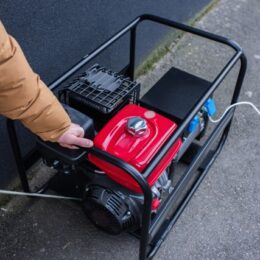
Before you depart, make sure you’re fully prepared for unexpected problems or emergencies.
STOCK YOUR VEHICLE
Even a well-maintained vehicle can break down, so it’s advisable to put together an emergency roadside kit to carry with you. A cell phone tops the list of suggested emergency kit contents since it allows you to call for help when and where you need it. Recommended emergency roadside kit contents include:
- Cell phone and charger
- First aid kit
- Flashlight
- Flares and a white flag
- Jumper cables
- Tire pressure gauge
- Jack (and ground mat) for changing a tire
- Work gloves and a change of clothes
- Basic repair tools and some duct tape (for temporarily repairing a hose leak)
- Water and paper towels for cleaning up
- Nonperishable food, drinking water, and medicines
- Extra windshield washer fluid
- Maps
- Emergency blankets and towels
PLAN YOUR ROUTE
Before heading out, check the weather, road conditions, and traffic. Don’t rush through your trip; allow plenty of time to reach your destination safely. Always familiarize yourself with directions and maps before you go, even if you use a GPS, and let others know your route and anticipated arrival time.
BE AWARE OF THE HEAT
As the temperature rises, your A/C must work harder to keep your vehicle cool. Check A/C performance before traveling. A lack of air conditioning on a hot summer day affects everyone but is particularly dangerous for people in poor health or sensitive to heat, such as children and older adults.
The summertime months have proven to be especially deadly for children when it comes to hot car deaths. Heatstroke in vehicles often occurs when a child is left unattended in a parked vehicle or manages to get into an unattended vehicle. Never leave children alone in the car — not even for a few minutes. Vehicles heat up quickly. Even if the outside temperature is in the 70s and the windows are cracked, the temperature in a vehicle can rapidly reach deadly levels. A child’s body temperature rises three to five times faster than an adult’s. Visit NHTSA.gov/heatstroke to learn more tips and reminders to prevent heatstroke.



